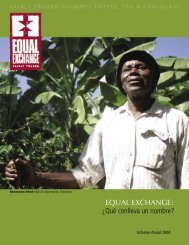TWENTY YEARS TWENTY YEARS - Equal Exchange
TWENTY YEARS TWENTY YEARS - Equal Exchange
TWENTY YEARS TWENTY YEARS - Equal Exchange
Create successful ePaper yourself
Turn your PDF publications into a flip-book with our unique Google optimized e-Paper software.
o u r s t o r y<strong>Equal</strong> <strong>Exchange</strong> was started20 years ago. Here is thestory of how it happened.To read the unabridgedversion of our story go toequalexchange.coop/storyA Vision ofFair ness toFar mer sFairness to Farmers. A closer connection between people and the farmers we all rely on.This was the essence of the vision that the three <strong>Equal</strong> <strong>Exchange</strong> founders Rink Dickinson,Jonathan Rosenthal, and Michael Rozyne held in their minds and hearts as they stoodtogether on a metaphorical cliff back in 1986. The three, who had met each other as managersat a New England food co-op, were part of a movement to transform the relationship betweenconsumers and food producers. At the end of three years the founders had a plan for a neworganization called <strong>Equal</strong> <strong>Exchange</strong> that would be:• A social change organization that would help farmers and their families gain morecontrol over their economic futures• A group that would educate consumers about trade issues affecting farmers• A provider of high-quality foods that would nourish the body and the soul• A company that would be controlled by the people who did the actual work• A community of dedicated individuals who believed that honesty, respect, and mutualbenefit are integral to any worthwhile endeavorNo Turning BackRink, Jonathan, and Michael understood that significant change only happens when you’reopen to taking big risks. So they cried “Adelante!” and took a running leap off the cliff. Theyleft their jobs. They invested their own money. And they turned to their families and friendsfor start-up funds and let them know there was a good chance they would never see thatmoney again. The core group of folks believed in their cause and decided to invest. Theirchecks provided the $100,000 needed to start the new company. With this modest financingin hand, Rink, Jonathan, and Michael headed into the great unknown. For the first threeyears <strong>Equal</strong> <strong>Exchange</strong> struggled and, like many new ventures, lost money. But the founderspersevered; by the third year they began to break even.Through the Loophole: Nicaraguan CoffeeIt was no accident that they chose Nicaraguan coffee as the first <strong>Equal</strong> <strong>Exchange</strong> product.In 1985, the Reagan administration imposed an embargo on all products from Nicaragua’sSandinista government. Importing coffee beans from Nicaragua would demonstrate solidaritywith the fledgling people’s movement and would challenge U.S. trade policies.<strong>Equal</strong> <strong>Exchange</strong> brought Nicaraguan coffee into the U.S. through a loophole in the law. Ifthe coffee was roasted in another country, it could be regarded as a productfrom that country, and therefore legally imported into the U.S. A friendlyDutch alternative trade organization stepped forward to broker and roastthe beans. Alerted to this symbolic action, the Reagan administrationtried to stop the tiny organization. Officials seized <strong>Equal</strong> <strong>Exchange</strong>’sNicaraguan coffee as soon as it arrived in the port of Boston. Duringtheir first two years of business, the founders spent many days, withtrade lawyers at their side, doing battle with customs officials. Eachtime the coffee cargo was released it was a small victory.3












